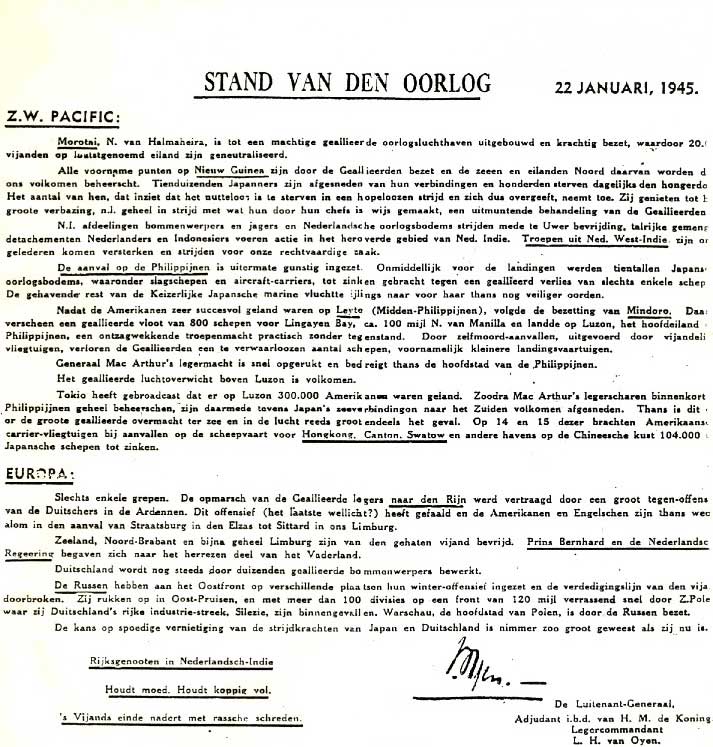Pamphlets
And then all of a sudden, on a Sunday morning the 28th of January 1945, we heard an aeroplane coming to Banyu Biru. We couldn't believe our eyes when we recognized the Dutch flag, red, white and blue on the Aeroplane. Every one of us, who was not ill, went to middle of the prison watching the sky and we what saw was a miracle. A Dutch aeroplane flying over our prison. We waved at the pilot and he waved back, this was the sign we had been waiting for so long, The war was over! We had every reason to believe this, because there were no shooting from the Japanese anti-aircraft guns side.
And then all of a sudden a second miracle happened, hundreds of pamphlets were falling down on us. I started running and was so lucky to receive one right into my hands. So I started running again back to my mother and sisters.
I gave the pamphlet to my mother so that she could read it first, she looked so happy.The pamphlet was signed by the commander of the Dutch East Indies Army in Canberra, Australia, general L.H. van Oyen.It told us that the war was almost over, not only in the Far East but in Europe as well, the Germans and Japanese were losing badly. I can't tell you how happy we all were. This was the most beautiful Sunday since years!
But not for long…
Cars came through the gate, Japanese officers jumped out of their cars and started screaming as I never heard them screaming before. Of course they were absolutely furious because now we all knew that Japan was losing the war. Our camp commander and a Swedish interpreter entered the camp and we all had to stand there and listen to his orders. We were told to bring him immediately all the pamphlets we had found! Everyone who tried to hide those pamphlets would be punished severely and the whole camp would have to go without any food for the rest of the day.
My mother was of course very scared and told me to destroy my pamphlet at once. But I told her that I wanted to keep it in order to show it to my father after the war.
Then my mother became very angry with me and told me to throw it away right now! I saw that she was really very scared so I began to tear up my precious pamphlet, into the smallest pieces possible then I went outside our cell and started walking while I dropped my tiny shreds all over the camp. Then I walked very slowly back hearing the Japanese military still screaming at the women who still stood there and not understanding why life could be so cruel. One moment the most beautiful Sunday morning ever, and then the next moment back to the life in our dirty stinking prison. Many of our mothers cried that day, my poor mother too, gone was the happy look on her face.
As from that Sunday on, life became a moral degeneration for all of us. Many died, life became too much for them, the eternal gnawing hunger, malaria and other illness and sufferings, left with no more hope for better days ever to come, they just faded away. Altogether 163 women and children died in the Banyu Biru prison. The bodies laying on a bamboo stretcher were carried outside the prison and were buried not too far away from us. At least so I heard, I have never seen those graves.
The Japanese military became even more strict than before, and several women were really been beaten up very nasty with a rough bamboo sticks.
My mother told me not to come to her with my optimistic stories, because she no longer believed in them, so she said. But the pamphlet that had come down from heaven had promised us that the war was almost over. And the news coming from the toil and moil group from camp 11 right behind us was also hopeful, they had received encouraging news through the hided radio in their camp.
Nevertheless my mother's warning, I stayed optimistic. I absolutely believed the Dutch commander-in-chief, general van Oyen, that it would be only a matter of months and the whole war would be over.
Then at last we could go back again to Sumber Sewu and Malang.

Pamphlets

